Over 400 delegates from more than 30 countries descended upon Milwaukee, town of beer, cheese and sausages on windswept Lake Michigan, in May for this year’s ELUNA annual conference. The hidden theme of a well-organised and informative conference was Transition, moving from old to new systems while managing the changeover process to reflect the changes going on in the information world.
A number of your IGeLU Product Working Groups were represented, with coordinators from Aleph, Voyager, Primo, SFX and MetaLib attending together with Steering Group representation, among delegates from other IGeLU member libraries in the US and abroad.

Plenary time was given to Ex Libris for their regular corporate update and Alma roadmap and product update presentations; their emphasis was very much on Alma and cloud computing. A 1-hour question and answer session was moderated by Pascal Calarco towards the end of the conference. They were also given time to present six identical demonstrations of Alma during the break-out sessions, so everyone would have a chance to see Alma in its latest incarnation, as well as their regular product updates. The hybrid nature of asset management is being addressed in the URD2, URM and Data Services, and Conference was very keen to see not just the theory but how Ex Libris will actually deliver. Indeed this was demonstrated to some extent.
The meat and drink of the conference of course was the break-out sessions, which contained a rich programme of over 70 customer presentations meeting many needs and ranging from the strategic change talks to the specific talks on Primo Central, bX and UStat. There were many talks, as you might expect, on Aleph and Voyager, but SFX, MetaLib, Digitool, Rosetta, Verde were not forgotten. These sessions also included regional user group and special interest group meetings.
Aleph sessions concentrated mostly on enhancements, presentations of innovative local customisations (some of which will be repeated in Haifa) and getting ready for using NERS for the 2012 enhancement process. Primo was well represented by 12 talks ranging from implementation experiences, through using interlinking with hierarchical layers of manuscript data, to the incomprehensible API. Delegates were given opportunities to voice their thoughts, offer themselves as volunteers, contribute at several NERS focus group sessions.
MetaLib, perhaps unsurprisingly, was represented by only one talk on analysing search queries. No surprises here: 90% of MetaLib searches are basic searches; of these, 85% are keyword searches. Of the remaining 10% advanced searches, 99% used the default ‘and’ boolean. There was however also a talk on Xerxes at Wisconsin-Madison and another on the Primo Central pilot at the University of Auckland.
For many of the ELUNA delegates, the conference was preceded by a 2-day Technical Seminar hosted by Ex Libris. So a long, hard week was concluded by a wrap-up session to welcome the new ELUNA steering committee and product working group members to be led by 2011/13 Chair Laura Morse, after which delegates will have returned home from windswept Milwaukee probably exhausted, maybe enthused, perhaps encouraged until next year’s conference in Salt Lake City, Utah.
Of course, intensive daytime conferencing activity merits reward. Much time was spent fulfilling perhaps the most valuable part of conference attendance by meeting fellow delegates and exchanging experiences and feedback, both during the day and in the evenings. The latter were spent at the Milwaukee Public Museum, over dinner with ELUNA product group counterparts, and drinking far too much at ELUNA’s kind expense with fellow IGeLU PWG attendees at the Milwaukee Ale House.
Jeremy Acland, Metalib PWG Coordinator (with contributions from our other PWG coordinators)
